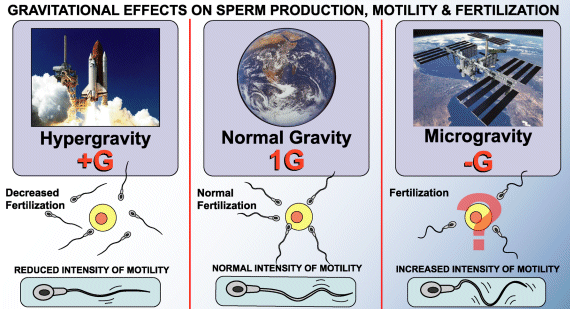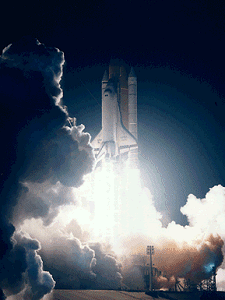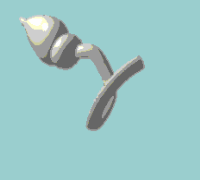|
Researchers have found that gravity - either
too much or too little of it - affects the behaviour of sperm in
puzzling ways.
by Karen Miller
Things are different in space.
Humans sleep upside down. Hot air doesn't
rise. Boiling water doesn't froth. Bones weaken, muscles atrophy,
and an ordinary sneeze can send you flying! The list goes on and
on....
Now scientists have added one more
item - a surprising and important one - to the list of things that
work oddly when the familiar feel of gravity vanishes:
Sperm.
According to Joseph Tash, a NASA-supported
physiologist at the University of Kansas Medical Centre, sperm behave
differently in the near-weightless environment of space than they
do on Earth. Whether these changes will impair or aid fertility,
he doesn't yet know. But, says Tash, it's becoming increasingly
clear that in outer space, fertilisation - of humans, of animals,
and even of plants - will very likely be affected.
The puzzling behaviour of space-faring
sperm first attracted attention in 1988 when the German researcher
U. Engelmann sent samples of bull sperm into orbit aboard a European
Space Agency rocket. His goal, in that and a later experiment, was
merely to determine whether changes in gravity affected the motility
(movement) of sperm. He found that it did. The tiny cells appeared
to move better in a low gravity environment - good news, it seemed,
for fertilisation, which is closely tied to sperm motility. Perhaps
making babies would actually be easier in space!
But, says Tash, who has studied the
sperm of sea urchins on board NASA shuttle flights, it's not so
simple.
Sperm movement, he explains, begins
with a process called phosphorylation - a chemical reaction widely
used by cells to control their own activities. In phosphorylation,
an enzyme changes the functioning of a protein within a cell. This
sets off a kind of domino chain reaction that starts some type of
activity - like causing the tails of sperm to move, and to propel
the sperm cell forward. On Earth, the tail movement is halted or
modified when a second enzyme, known as a protein phosphatase, kicks
in.

Image Credit. Dr. J. Tash. University of Kansas
Medical Centre
The behaviour
of sperm - a basic biological process - is affected by gravity.
|
In microgravity, Tash found that the second
enzymes don't do their job within the normal time period.
Although his results may explain why
sperm move faster in space, they don't necessarily imply that fertilisation
will be easier. After all, if one enzyme (protein phosphatase) isn't
activated properly perhaps others will be affected, too. Many enzyme
reactions play a role in the fertilisation process: for example,
to ready the sperm to insert the DNA into the egg. Says Tash: if
enzyme processes are being altered by gravity - and they are - you
can't even guess at the effect on fertilisation until you've studied
more than just sperm movement.
Tash conducted his initial research
using the European Space Agency's Biorack
Facility on board shuttle missions STS-81 and STS-84. "Those
were part of the MIR docking flights," he explains, "and there was
no room for microscopes. Although we wanted to, we could not actually
look at the sperm motility itself." As it turned out, doing without
microscopes led to unexpected benefits. They were forced to concentrate
instead on the proteins that are connected with the process. "As
a result," says Tash, "we were able to identify [previously-unknown]
proteins in the sperm tail that are very tightly coupled to the
initiation of sperm movement."

In 1997 Space
Shuttle Atlantis carried sperm from sea urchins into space
for Tash's experiments.
|
More recently, Tash has studied the effects
on sperm of hypergravity (greater than normal gravity). Working with
a centrifuging microscope in Germany, he was able to examine activated
sea urchin sperm under conditions up to 5 G (five times normal Earth
gravity). His findings expanded on the results of the shuttle experiments.
On the shuttle, Tash explained, researchers
examined the proteins by activating millions of immotile sperm and
then, using antibodies, looking at the way the proteins had changed
30 and 60 seconds later. With the centrifuging microscope, "we were
actually taking measurements of individual sperm cells." Following
each of the unique wrigglings of hundreds of individual sperm, Tash
found that sperm motility begins to deteriorate at as little as
1.3 Gs. And, he found, in hypergravity fertilisation itself is reduced
by a full 50%. As in microgravity these effects seem to be driven
by changes in phosphorylation.
It's actually astonishing that something
as tiny as sperm could be affected by gravity. Physicists, says
Tash, "might argue that the size of molecules critical to sperm
movement are not big enough to be sensitive to gravity." But, he
points out, the head of a sperm is about the same size as statoliths
in plants - small floating granules that help plants tell up from
down. Gravity may in fact affect things that are even smaller. Researchers,
says Tash, are now beginning to find evidence that even the individual
proteins that form the structures of the sperm tail may be sensitive
to gravity changes.

Credit: Chris Patton, Stanford University. [More]
The sperm moves
by rotating its tail in a spiral motion through the water.
This induces waves of force backward propelling the sperm
forward. If the sperm hits a hard surface, like an egg, the
spiral motion will cause the entire sperm to rotate.
|
No one knows exactly how gravity affects
cells. It may have to do with the cytoskeleton: the structure that
gives a cell its shape. Proteins that send signals are often physically
connected with the cytoskeleton, says Tash. Perhaps, he says, there
is a mechanism in which the gravitational forces on the sperm head
are somehow transmitted into the cytoskeleton, which then affects
the signalling pathways that alter movement.
This is a puzzle humans need to solve
if we plan to spend much time in space. Ultimately, our exploration
of space may rely on the ability of many species to reproduce in
microgravity: not only humans, but also animals and greenhouse plants.
"For NASA," says Tash, "the basic underlying
question is: Do changes in gravitational force affect the ability
of species to reproduce?" Increasingly, the answer seems to be yes.
"It's an area," he says, "that requires a lot more attention."
Note:
Why does Tash use sea urchin sperm for his experiments? Despite
the unusual source, sperm and sperm movement are universal in the
animal kingdom, Tash says. Sea urchin sperm is used because there
is less variation from one urchin to another than there is among
humans or other mammals. Sea urchin sperm can also survive pre-launch
delays better than many other species.
|
